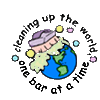






Upcoming
Shows Top
Ten List What
You Say

SUMMER
2000 Environmental News
Are you
an Environmental Whiz? Take a quiz
to find out.
The Fight for Clean Air
- In 1999, Texas was the first to exceed
the EPA health standard for smog - on March 6th! March 12th was the first
smog day in Florida. California, Louisiana, Mississippi, Pennsylvania, Tennessee
and Texas all had smog days as late as October or even November 1999. Here's
the whole report.
- The EPA is accepting public comments
on whether or not to clean up the nation's biggest and dirtiest vehicles.
The Biggest SUVs Emit As Much as Five Times More Pollution than A Regular
Car! When the EPA first proposed the emissions standards for cars and light
trucks this summer, they left out the largest and dirtiest SUVs. These "heavy
duty" SUVs include the Suburban, the Excursion, the GM Express Wagon, the
Dodge Ram Wagon and Ford Econoline Wagon. EPA estimates that there are 75,000
of these large SUVs sold per year. Don't buy these vehicles!
- Can you legislate clean air and clean
water? George
W. Bush says 'NO!'
- In May, the EPA proposed new
emissions standards for heavy-duty vehicles that would reduce smog-forming
pollution by 95 percent and soot pollution by 90 percent from new diesel vehicles.
The EPA estimates that the diesel rule, which would go into effect in 2007,
will reduce emissions of smog-forming pollution by 2.8 million tons per year
and will reduce particulate or "soot" from these vehicles by 110,000 tons
per year, starting in 2030 when all vehicles on the road meet the new standards.
- The EPA's new emissions standards for
heavy-duty vehicles will prevent:
- More than 4,000 premature deaths
each year;
- Nearly 3,000 hospital admissions
each year;
- More than 6,300 total respiratory
emergency room visits;
- More than 5.6 million "minor restricted
activity days" being declared nationwide each year; and
- More than 650,000 work loss days,
nationwide, saving more than $67 million a year.
Protect our Water
- Nearly 270 million pounds of toxic chemicals
were released to American waterways during 1997, either directly or through
water treatment facilities.The bodies of water receiving the greatest amounts
of toxic chemicals were the Mississippi River, the Connequenessing Creek (PA),
the Brazos River (TX), the Alafia River (FL), and the Houston Ship
Channel (TX). The states with the greatest amounts of toxic pollution
were Louisiana, Pennsylvania, Texas, Mississippi, Ohio, Florida, and New Jersey.
The parent corporations with the greatest amounts of toxic pollution to waterways
were Armco Inc., PCS Nitrogen Fertilizer LP, BASF Corporation, E. I. Du Pont
De Nemours & Co., and Vicksburg Chemical Co. Read
the whole report.
- Less than half of 1% of all the water
on the globe is drinkable.Worldwide, the consumption of water is doubling
every 20 years. The US Southwest, Florida, and California are especially vulnerable
to shortages and scarcity. Canada, on the other hand is blessed - they have
some 20% of the world's entire supply of freshwater. Should we invade?! Read
the whole story by our famous Texan,
Jim Hightower.
- Does arsenic taste good? Congress must
think so! Earlier this year Congress voted against clean drinking water by
blocking enforcement of the EPA's new standard for arsenic. Read
about all the Toxic Riders in Congress.
Rescue our Animals
- Massive international (15 countries)
and domestic (65 Japanese organizations) have protested to stop Japanese
whaling. The Japanese Government has been bombarded with protests over
its killing of three protected species of whales. These unique initiatives
add to pressure on Japan to stop whaling from a joint letter of protest from
Tony Blair, Bill Clinton and Helen Clark, Prime Minister of New Zealand; a
resolution passed by the International Whaling Commission (IWC); and the threat
of trade sanctions by the USA.
- We are now losing the war on protecting
endangered species. We are losing species at a rate not seen since the
dinosaurs disappeared 65 million years ago. Harvard biologist E.O. Wilson
estimates that this current rate of extinction is 10,000 times faster than
what's "normal" or "natural." The number one cause of extinction is the destruction
and degradation of habitat. More than 90% of America's original old-growth
forests have been logged, over 50% of our wetlands have been drained, developed
and destroyed and 98 % of our grasslands are gone or are suffering from intensive
corporate farming, overgrazing and development. We must do three things to
salvage what's left - strengthen protections for endangered species, enforce
our environmental laws that are designed to protect species and their habitat,
and end destructive land use practices. Read
the whole report.
Save our Land
- Of the 191 million acres of National
Forests in 44 states, only 18 percent - less than 35 million acres - is protected
from development. The Clinton-Gore administration has the unique opportunity
to permanently protect all 60 million acres of unprotected wilderness
in our National Forests - this is a must! Please take action
.
- The Arctic National Wildlife Refuge is
America's last great wildernesses, home to abundant wildlife. But multinational
oil companies ( BP Amoco, ExxonMobil, Philips Petroleum, and Chevron) want
to drill in the heart of this spectacular landscape. These companies have
also worked to win friends in Congress by contributing more than $8.7 million
to their campaigns and to the Republican and Democratic party campaign committees.
The U.S. Geological Survey assessment of the coastal plain estimates that
the oil found in the Arctic Refuge would meet the energy needs of the United
States for only four to six months. With several bills languishing,
Arctic advocates are now appealing to President Clinton — who can preserve
the area by designating the coastal plain a National Monument. The Arctic
National Wildlife Refuge must be protected. There is simply no place like
it on Earth! Please take
action.

Copyright © 2000-2005 Austin
Natural Soap All rights reserved. You may not duplicate any portion of this
website.
Questions or comments? Contact
Austin Natural Soap at
[email protected]

